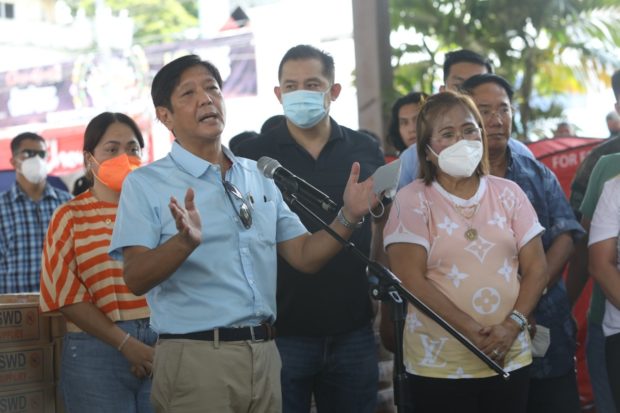
President Ferdinand Marcos Jr. visits Abra on Thursday, July 28, 2022, where many people were injured and properties damaged after a 7.0-magnitude hit the province on Wednesday. The injured residents were at hospital tents in front of the Abra Provincial Hospital in Bangued town. Joining Marcos Jr. in Abra are Speaker Martin Romualdez, Social Welfare Sec. Erwin Tulfo, Sen. Imee Marcos, Abra Gov. Dominic Valera, and Interior and Local Government Sec. Benjamin Abalos, Jr. The government officials assure the victims of immediate support and assistance, especially food and water supply. Photo from the Office of Speaker Martin Romualdez
MANILA, Philippines — President Ferdinand Marcos Jr. has ordered coordinated efforts between the national government and the local government units in areas battered by the strong earthquake.
According to Marcos Jr., the LGUs have a better idea of navigating their jurisdictions and responding to their constituents’ needs.
He also pointed out that close coordination between national government agencies and LGUs may avoid duplication of actions and allow the best use of resources.
“I know I have said it but I will repeat it, mga national government agencies, lahat ng gagawin ninyo please coordinate closely with the local government para ma-maximize ang inyong mga assets, hindi kayo nag-uulit, hindi kayo nagkukulang, you plan everything together,” Marcos Jr. said as he leads a situation briefing in Bangued, Abra, on Thursday.
(I know I have said it, but I will repeat it, all national government agencies, in all things you do, please, please coordinate closely with the local government so that we can maximize our assets, you would not repeat things, you would not be lacking, you plan everything together.)
The briefing was attended by officials from the national government, including Senator Imee Marcos and Speaker Martin Romualdez, and LGUs from the Ilocos Region and Cordillera Administrative Region where many areas were seriously affected by the 7.0-magnitude tremor that hit Abra on Wednesday morning.
“You listen to the local governments because – tiga-rito rin naman kayo eh (you are also familiar with the place), but you listen to the local governments kasi sila ang (because), they are the ones who have the fundamental responsibility to bring this aid to our people, to those who have been hurt,” he added.
But Marcos Jr. also reminded the local governments at one point to communicate with national agencies, especially as local manpower would be very crucial to response efforts in the aftermath of the earthquake.
The President also asked concerned agencies to expedite the repair of bridges and the assessment of possible damage to residential areas.
“All right, we have to organize also I guess local government kasi ‘yung mga staff ninyo ang gagamitin. Kung hindi naman injured ‘yung mga evacuees, paano natin as soon as possible maibalik? Kaya nga tinanong ko kung kailangan tayo puwedeng pumasok sa mga bahay para maibalik sila sa bahay nila,” he said.
(All right, we have to organize also I guess local government because your staffers would be tapped. If the evacuees are not injured, how can we help them return to their homes as soon as possible? That’s why I was asking when we can come inside homes to inspect so they can return.)
“And for those that have damage, do we need to provide usually, at least for temporarily hinihingi niyan mga trapal, mga GI sheet, plywood, mga dos por dos, ‘yang ang para mayroon lang sila… Kagaya ng mga bubong na nasira at least ma-cover-an nila habang nire-repair para puwede na silang makatira doon.”
(And for those that have damage, do we need to provide usually, at least temporarily, they may ask for tarpaulins, galvanized iron sheets, plywood, some 2×2 lumber wood so that they can just have those… Like roofs that were destroyed which they can at least cover while being repaired so they can already live there again.)
“But the first part is going to be really kung (if) it’s safe. We have to determine that it’s safe,” he added.
Marcos Jr. flew to Abra on Thursday morning to check on the situation in the province following the earthquake.
Extensive damage has been reported in different areas in the highlands of the Cordillera and nearby regions.
The NDRRMC said it so far received reports indicating that five people were killed during the quake and that some roads were still impassable as aftershocks brought a new wave of rock slides and landslides.
READ: Earthquake damages structures, bridges in Abra town — initial reports
“Work together with the local government so that we can make sure na walang nangangailangan na hindi natin nabigyan ng tulong,” Marcos Jr. continued, telling national government agencies. “The LGUs are always the ones — the municipal mayors, the governors, the vice governors ay kayo ang nakakaalam kung ano what the situation is on the ground.”
(Work together with the local government so that we can make sure that no one is left without assistance. The LGUs are always the ones – the municipal mayors, the governors, the vice governors. They know the situation on the ground.)